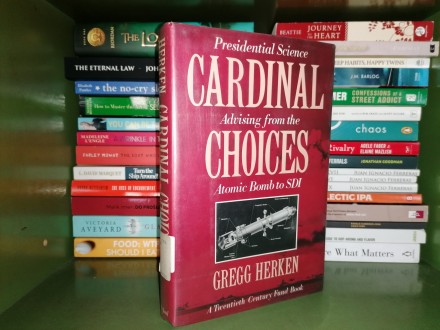Cardinal Choices: Presidential Science Advising from th
| Cena: |
| Želi ovaj predmet: | 3 |
| Stanje: | Polovan bez oštećenja |
| Garancija: | Ne |
| Isporuka: | Pošta CC paket (Pošta) Post Express Lično preuzimanje |
| Plaćanje: | Tekući račun (pre slanja) PostNet (pre slanja) Pouzećem Lično |
| Grad: |
Smederevska Palanka, Smederevska Palanka |
ISBN: Ostalo
Godina izdanja: 1992
Jezik: Engleski
Autor: Strani
CARDINAL CHOICES
PRESIDENTIAL SCIENCE ADVISING FROM THE ATOMIC BOMB TO SDI
Engrossing and enlightening account of the checkered relationship between the scientific community and federal government from the Manhattan Project to SDI, by Herken (The Winning Weapon, 1980). Just how delicate the decisions are that shape nuclear-weapons policy is made very clear here: Even as Hitler`s anti-Semitism drove vital nuclear scientists from Germany, Herken explains, so did a preoccupied American establishment ignore their significance until Leo Szilard used Albert Einstein`s vast prestige to catch FDR`s attention. Similarly, Harry Truman, who according to Herken was misinformed by nonscientist General Leslie Groves, used the bomb at Hiroshima rather than "demonstrate" it on an uninhabited area, even though evidence is strong that such a demonstration was favored by FDR and most scientists: Thus was the US identified for all time and with incalculable international results as the first (and so far only) user of the ultimate war technology. Herken traces nuclear policy through the emergence of Edward Teller and the H-bomb, the awesome stockpiling of weapons in the cold war, and attempted disarmament—a trail, he shows, on which political accident, personal ambition, national paranoia, and financial imperative continually and irreversibly shape policy. By 1980, the split between the government and the scientific community had so widened that, three months into office, Ronald Reagan had no science advisor because no serious candidate would take that thankless post. Reagan considered abolishing the position, and his budget director wanted to gut the White House`s scientific advisory staff, since "we know what we want to do, and they`ll only give us contrary advice." As the author demonstrates, the stage was set for the stupefyingly expensive, perhaps ultimately unworkable SDI. Herken`s clear, well-documented writing and his close attention to the human element make for a fascinating and wisely cautionary study.
Predmet: 62214785















